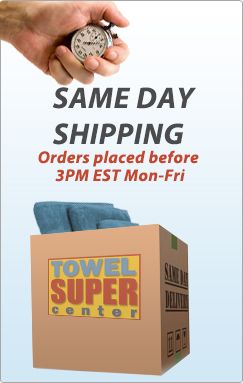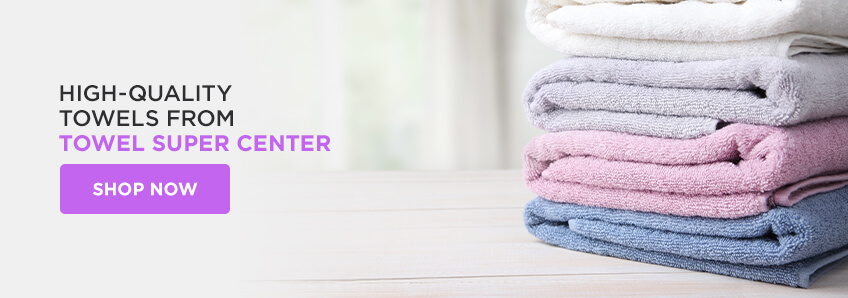How to Clean Mildew, Mold and Bacteria From Towels
- Created: Tuesday, 22 December 2020 15:03
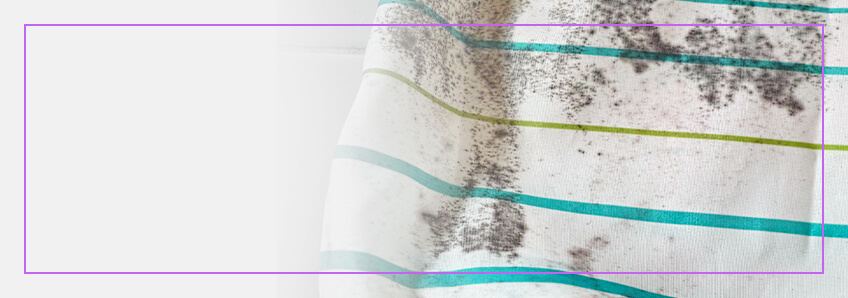
We've all been there — you go to use a fresh towel, and it smells musty even though it was freshly washed. It can be frustrating to expect a new, clean, fluffy towel after a good shower and get a smelly one.
Towels produce a musty smell due to mildew growing on the material. Mildew and bacteria multiply in damp areas or soft materials, making towels a perfect breeding ground. Luckily there is a straightforward fix to this problem.
However, before you can solve the problem, you need to understand why it is happening and how you can prevent it from recurring. Explore how towels get mildew and bacteria, how you can remove the smell of mildew and how to prevent towels from growing mold.
- How Do Towels Get Mildew and Bacteria?
- How to Remove Mildew Smell and Bacteria From Towels
- How to Remove Mold From Towels
- What Is the Difference Between Mildew and Black Mold?
- How to Prevent Towels From Getting Mildew, Mold and Bacteria
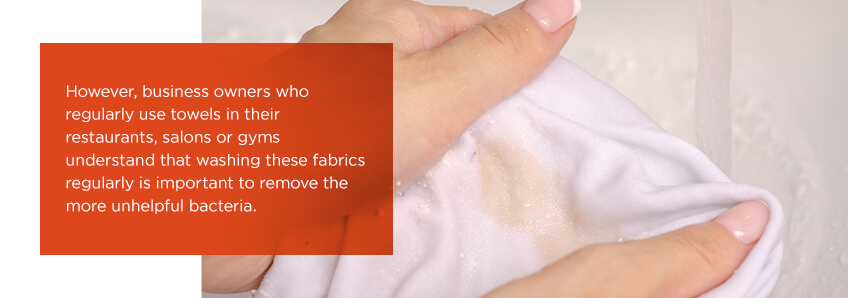
How Do Towels Get Mildew and Bacteria?
While the thought of bacteria may produce a negative image, humans need some healthy bacteria to live and grow. For example, the bacteria found in yogurt, cheese and buttermilk improve gut health and body processes. You can find probiotics, also called healthy bacteria, in many foods or supplements that improve your overall health.
However, business owners who regularly use towels in their restaurants, salons or gyms understand that washing these fabrics regularly is important to remove the more unhelpful bacteria.
Bacteria left on wet towels may produce adverse effects. One study found that almost 90% of tested towels showed traces of coliform, while around 25% were home to E. coli. The bacteria were present in kitchen towels, which were washed infrequently and left out after usage.
Harmful bacteria on towels should be dealt with immediately. Otherwise, they may develop mildew and mold.
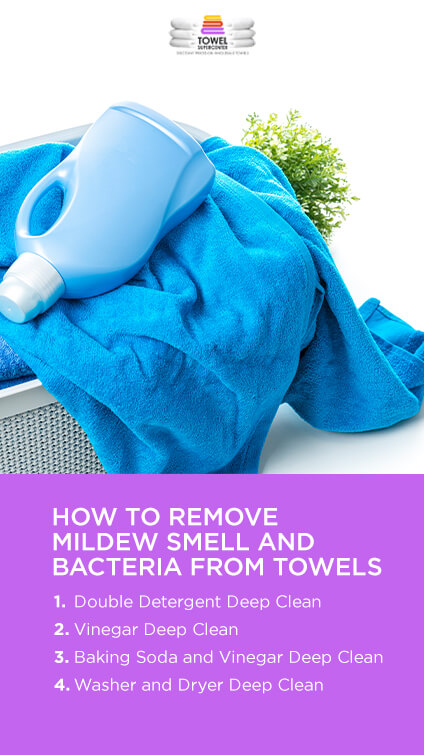
How to Remove Mildew Smell and Bacteria From Towels
Many business owners may wonder how to get mildew and musty smells out of towels. The thickness of towels makes them ideal for moisture to collect, which is excellent since they exist to absorb excess water. However, too much moisture can be a deterrent.
That's why you must allow your towels to dry completely after being used or washed. Removing your laundry from the washer right after it's done is the easiest solution, but sometimes life gets away from us and a freshly washed load gets left in longer than it should. Towels left in the washer or dryer may produce bacteria due to the dampness of towels or the dark space of the machine.
However, if you know how to clean towels properly, you can live free of musty, smelly towels. There are several ways to wash your towels properly, and you can even target the potential source of the problem: your washing machine and dryer.
Here are a few things you can do to make your towels look new again.
1. Double Detergent Deep Clean
Depending on how much mildew and bacteria are present on your towels, two simple towel-only loads with your regular detergent may solve your problem. You must run two cycles, one after the other, using a moderate amount of detergent.
Remember to avoid fabric softener, as it can leave residue and buildup on your towels, which will only encourage more bacteria to grow. Towels often soak up fabric softener, making it harder to wash off the coated chemicals in the washing machine. That layer of fabric softener not only keeps the towels from being adequately washed but also keeps them from becoming completely dry, allowing bacteria to multiply.
Ensure you use the right amount of detergent when washing the towel loads. Too much detergent may cause adverse effects. Because of the absorbency of towels, your washing machine may not be able to wash away all of the detergent, which will then build up and keep your towels from being as absorbent as they should be. Detergents are designed to use a small amount, so use only the recommended amount on the bottle.
2. Vinegar Deep Clean
Household white vinegar is a lifesaver in many ways. As a natural cleaner free of artificial chemicals, ensuring your towels come out fresh and free of mildew is one of its perks.
White vinegar helps your washing machine get those stubborn layers of fabric softener and detergent off your towels, and the acidity of vinegar kills the harmful bacteria before they can grow anymore. Start by loading your washer with several towels and add one cup of vinegar. Run the washing machine on the hottest setting possible.
After washing the load with vinegar, rewash it on a regular cycle with a moderate amount of detergent. Then, immediately move the washed towels to the dryer, dry them on the hottest cycle, and ensure they are totally dry before removing them.
Remember not to leave the towels in the washing machine after the wash is done — otherwise, all your hard work will be for nothing since damp towels will begin to grow bacteria quickly.
3. Baking Soda and Vinegar Deep Clean
While vinegar is a miracle worker, it becomes a superstar when coupled with baking soda.
You'll need to run two towel-only loads to perform this deep clean. But, in this method, you first load the towels with a quarter cup of baking soda. Then run the washing machine on the hottest cycle possible. Heat kills harmful bacteria, so the hot water washed with the baking soda is like a deep clean.
After the baking soda wash, rerun the washing machine — using the hottest cycle, of course — along with a full cup of white vinegar. Once they are done in the washer, move the towels to the dryer and ensure they get completely dried before putting them away.
This method is perfect for removing bacteria from your towels because the vinegar acid will break down deposits and grime on your towels, which your machine will wash away. Baking soda is known for neutralizing odors, thanks to the fact that baking soda is an alkaline substance. It absorbs foul smells and breaks down and dissolves dirt and grease, which is why it's such a favorite to keep foul odors out of your fridge.
Though this method is effective, be sure you do not mix vinegar and baking soda in the same load. Both natural cleaners may effectively reduce odors and stains, but when paired together, they produce a foam that may harm your towels and machine.
4. Washer and Dryer Deep Clean
If you've tried the detergent, vinegar and baking soda and still find your towels smelling musty, your washer or dryer may be the problem. Giving your washing machine and dryer a deep clean will kill any lingering bacteria, which will inevitably prevent them from transferring onto your clean laundry.
To give your washer a deep clean, run it empty on the longest cycle with two cups of white vinegar or half a cup of bleach. Rub it down with a clean rag soaked in vinegar and water at the end of the cycle.
Deep clean your dryer by wiping the inside with a clean cloth soaked in vinegar and water. You should also wash the lint trap and ensure it is completely dry before reinserting it.
How to Remove Mold From Towels
Wet towels are a breeding ground for fungi, especially in business settings with a large number of towels to wash. Those who own a gym, salon or golf business may often notice the appearance of mildew or mold spots due to an increase in damp, dark areas. If you notice black mold on your towels, your first instinct might be to throw them away — but before you do, explore what steps to take to remove mold from towels.
What Is Black Mold?
Many types of mold are black and there is no single mold called "black mold." People may refer to Stachybotrys atra, also known as Stachybotrys chartarum, when they use the term.
This greenish-back mold can grow on materials with high cellulose content and flourish when there is moisture from flooding, water infiltration, condensation, water leaks or water damage.
5 Steps to Remove Mold From Towels
Take the following steps when you can see evidence of mold on your towel's surface:
- Remove loose mold spores: Shake out the towels and brush the mold off the fabric. Avoid shaking the towels indoors where mold spores grow and thrive.
- Put moldy towels in the wash: Wash the towels at a manufacturer-recommended temperature and add your preferred detergent and bleach. Use the heavy, cotton or standard setting, which ensures a long, thorough wash.
- Repeatedly wash when necessary: Wash the towels again if you see more mold spots. Let the fabric soak in the bleach or detergent for several minutes before repeating the thorough wash cycle.
- Dry towels outside: Dry your towels outside in the sun, where the fresh air and light can eliminate odors and bleach stains.
- Put towels in the dryer: Ensure towels are dry before placing them on another dryer cycle for several minutes.
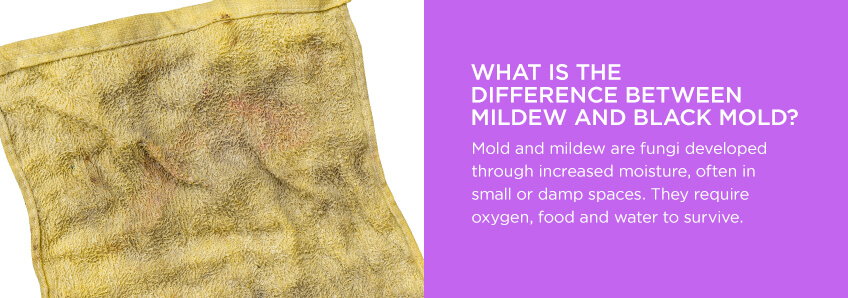
What Is the Difference Between Mildew and Black Mold?
Mold and mildew are fungi developed through increased moisture, often in small or damp spaces. They require oxygen, food and water to survive. While they often produce in various temperatures, many strains thrive in warm, moist places. Both mold and mildew on towels may cause health concerns, though black mold is usually the more dangerous of the two.
Some common characteristics of mildew include the following:
- Flat shape
- White, gray or brown color
- Powdery consistency
- Small dots
Mold presents with the following colors and consistencies:
- Fuzzy shape
- Deep green, black or red color
- Dirt-like consistency
Both fungi require specific conditions to survive. They form through mold spores which grow using food — like soil or dirt — oxygen and water. You'll often see mildew and mold in damp or perpetually wet spaces as they offer the best environment for high mold production. Mold spores will find a good surface to grow and thrive. Mildew produces white spots which spread out while mold eats into the base of the material and grows upward.
Many homeowners find themselves worried about health concerns regarding mildew and black mold. Both fungi growths may cause reactions like:
- Itchy eyes: The eyes may become itchy, watery and swollen.
- Shortness of breath: You might have trouble breathing and experience dizziness.
- Runny nose: Mold and mildew may cause a runny nose and sneezing.
- Asthma flare-ups: Those with asthma may have trouble breathing or experience wheezing or severe flare-ups.
- Allergic reactions: Those with severe allergies to mold and mildew may experience hives or swollen skin.
How to Prevent Towels From Getting Mildew, Mold and Bacteria
Knowing how to clean towels to remove bacteria and mildew is great, but prevention is always better. Plus, preventing mildew is much easier than getting rid of it!
To prevent mildew and bacteria from growing on your towels, ensure towels dry entirely. Removing the possibility of moisture will remove the opportunity for bacteria to breed.
1. After Use
It would help to always hang up towels after using them. When you hang them after a shower, ensure there are no folds in the towels so they dry completely. If you plan to hang up a bath towel for reuse, consider drying it off on a rack or hanger without any present folds. Leave it in a well-ventilated area to reduce the chance of bacteria and fungi, especially if you hang your towel to dry in your bathroom after showering. Ensure the exhaust fan is on during and after your shower to eliminate the excess humidity.
Bath towels should be washed at least every few uses to kill growing bacteria. Towels may attract more bacteria the longer they go without proper washing. Dirt and bacteria may accumulate the more the towel is used.
2. Before Washing
Try regularly washing your machine and dryer with a deep-cleaning vinegar solution. Vinegar is a natural cleaner that ensures your washing machine remains sanitary and does not spread bacteria or mildew to your towels, fabrics, linens or clothes. You can't avoid water when using a washing machine, but you can reduce the amount of remaining moisture between washes which often becomes a breeding ground for bacteria.
And remember, your towels should be washed in a load of their own, without any other clothes. You don't want any potential bacteria from the towels to transfer onto your other clothes, so it's best to give towels a load of their own and wash them in warm or hot water. Limiting the loads to three or four large bath towels is also best since they will absorb more water and take longer to dry.
If you're a fan of fabric softeners, a good alternative is white vinegar. Fabric softener can leave a slight residue on your towels, which will only build up the more often you wash your towels with it. Vinegar does everything a fabric softener does, killing bacteria and preventing your clothes from getting staticky.
3. After Washing
Once again, ensure your towels are dry before you fold them up and store them away for later use. You may think some dampness is harmless, but even the slightest moisture will encourage bacterial growth and can lead to mildew and an offensive odor.
Dry towels on the highest heat, and if they're still not dry, hang them out in direct sunlight until every drop of moisture is gone.
Folding a damp towel creates the perfect environment for bacteria and final growth due to the moist and dark areas of the folds. You should always ensure a towel is completely dry and clean before folding.
High-Quality Towels From Towel Super Center
Tower Super Center is the go-to place for all your towel needs as the leading wholesale online towel supplier. Whether you're looking for towels to furnish your hotel, yoga or sports towels for your gym or hand towels and washcloths for your barbershop or car detailing business, Tower Super Center has you covered.
Our heavy-duty commercial towels are durable, so they can satisfy the needs of your business for years to come. The quality of household towels can deteriorate with multiple washes, making the towels less absorbent. Still, our towels are targeted toward businesses, so they will stay soft, absorbent and fluffy no matter how often they are washed.
Our terrycloth towels, made from 100% cotton, are available in various sizes and colors, making them ideal for any business, from spas and fitness centers to hotels, restaurants and more. We understand that towels are necessary for many companies and are used often and in bulk. That's why we offer wholesale supplies — you can save money and still get the high-quality towels you need.
Please browse our online catalog now and start equipping your business with the best towels from Towel Super Center.



